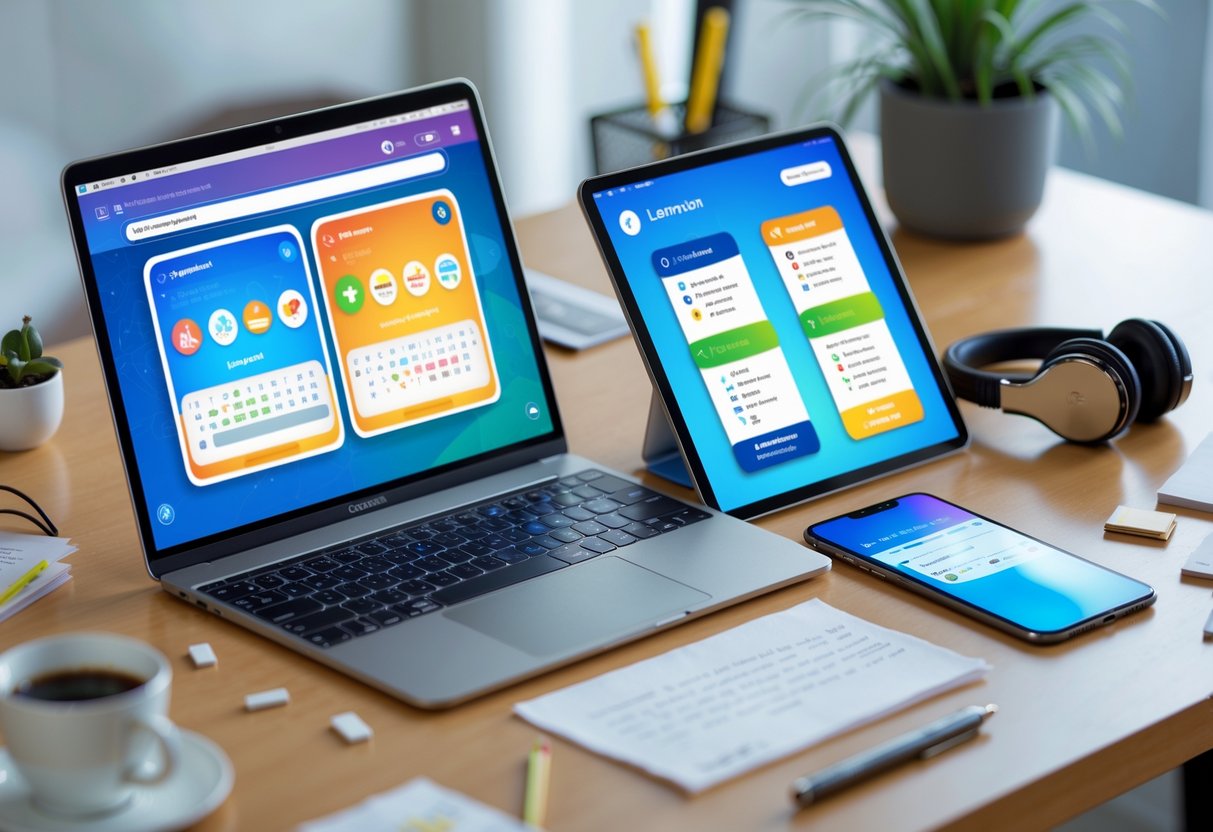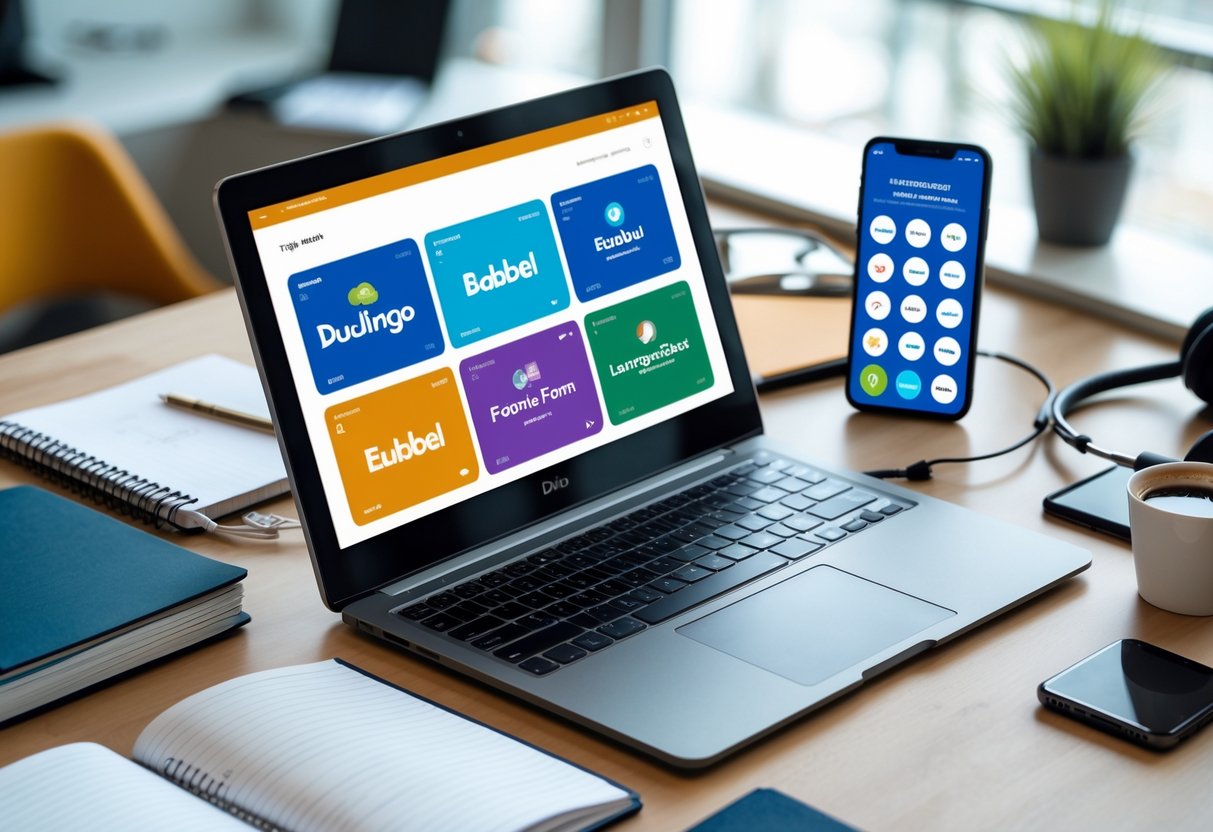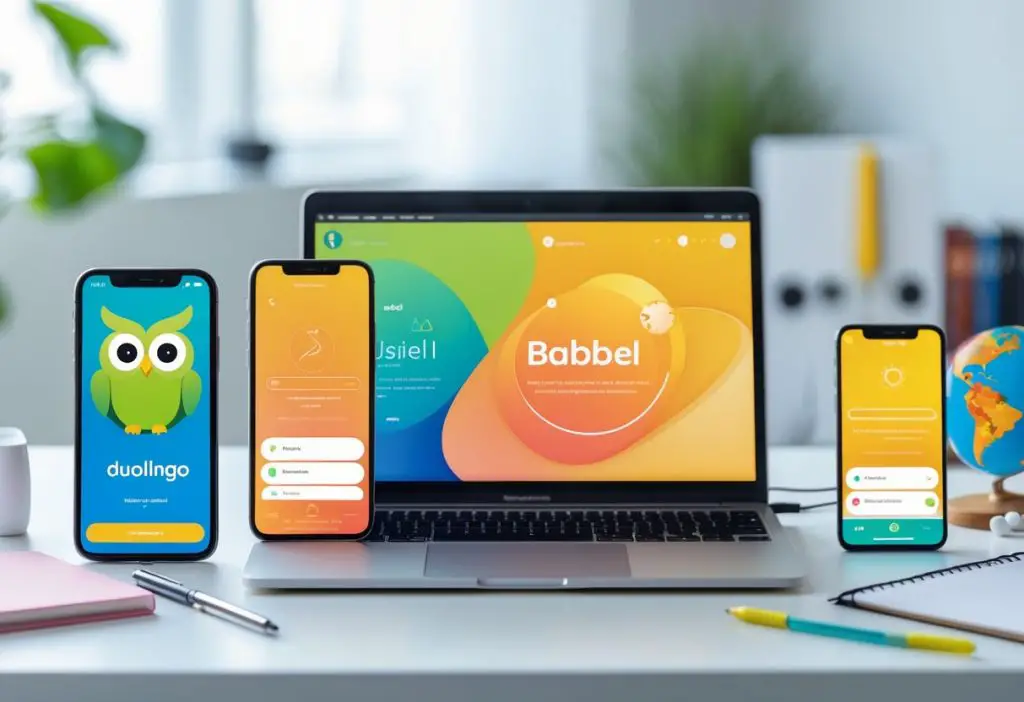Choosing between Babbel vs Rosetta Stone, vs Duolingo can feel overwhelming, but the differences are clear once you know what each offers. Duolingo works best for casual practice, Babbel focuses on real conversations, and Rosetta Stone builds strong foundations through immersion.
You want a tool that matches your goals, whether that’s learning a few phrases for travel, holding deeper conversations, or mastering grammar step by step. Each platform takes a different approach, so knowing how they compare saves you time and effort.
Key Takeaways
- Each platform teaches languages in a different way
- Your choice depends on whether you want casual, conversational, or immersive learning
- Knowing the strengths of each makes it easier to pick the right one
Duolingo vs Babbel vs Rosetta Stone: Core Differences and Similarities
Each platform uses a different way to teach, offers different language options, and sets prices for different needs. The main differences come from how you practice, what languages you can learn, and how much you pay for access.
Learning Methodologies
Unlike Rosetta Stone and Babbel, Duolingo uses short lessons with gamified exercises. You earn points, unlock levels, and stay motivated with streaks. The focus is on repetition and quick practice, which helps you build habits but may not always give deep grammar explanations.
Babbel takes a more structured approach. Lessons follow a clear path with grammar notes and cultural context. You practice speaking, writing, and reading in a sequence that feels similar to a classroom. This makes Babbel better if you want more explanation and step-by-step progress.
Rosetta Stone uses an immersive method. Instead of translating, you match words with images and learn a language through context. You hear and repeat phrases to build pronunciation skills. This method is slower but can help you think directly in the new language instead of translating back to English.
| Platform | Method Style | Strengths | Weaknesses |
|---|---|---|---|
| Duolingo | Gamified, bite-sized | Fun, habit-forming | Limited depth |
| Babbel | Structured, grammar-based | Clear explanations, real-world use | Less playful, subscription only |
| Rosetta Stone | Immersive, image-based | Strong focus on speaking, context | Can feel repetitive, slower |
Language Selection and Accessibility
Duolingo offers over 40 languages, including popular ones like Spanish and French, and less common ones like Hawaiian and Welsh. You can use it on mobile and desktop for free, though ads appear unless you pay for premium.
Babbel’s structured approach supports 14 languages, focusing on widely spoken ones such as Spanish, German, and Italian. It works best on mobile or web, and you must subscribe to unlock lessons. Unlike Duolingo, it does not offer free access beyond a short free trial.
Rosetta Stone covers 25 languages, including Arabic, Chinese, and Russian. It has apps, desktop access, and offline lessons. You pay for a subscription or a lifetime plan. Accessibility is strong, but it requires commitment since lessons are longer and less flexible than Duolingo’s.
Target Audience and Pricing
Duolingo works well if you want a free option or casual daily practice. Its premium plan, called Super Duolingo, removes ads and adds features like unlimited mistakes. It is the most affordable choice if cost is your main concern.
Babbel targets learners who want structured lessons with grammar support. Subscriptions range from monthly to yearly plans, with prices higher than Duolingo but lower than Rosetta Stone. It suits you if you want more depth without paying for a lifetime license.
Rosetta Stone is aimed at users who prefer full immersion and long-term study. It offers monthly subscriptions, but many choose the lifetime plan for access to all languages. Pricing is the highest of the three, making it best for serious learners who want a traditional and immersive program.
Practical Language Skills and User Experience

Each platform helps you practice in different ways, from how lessons are built to how you test your speaking. You will notice differences in how much focus is placed on grammar, pronunciation, and cultural context.
Lesson Structure and Progression
Duolingo uses short, gamified lessons that feel quick and repetitive. You unlock levels as you go, and the app pushes you to practice daily. This format works well if you prefer small study sessions and steady progress.
Babbel takes a more structured approach. Lessons are longer and build on each other in a clear order. You get grammar explanations alongside vocabulary, which helps you understand how sentences work rather than just memorizing words.
Rosetta Stone focuses on immersion. Rosetta Stone’s immersive lessons rely heavily on images and repetition without translations. This method encourages you to think in the new language, but it can feel slow if you prefer direct explanations.
Comparison at a glance:
- Duolingo: Quick, game-like, less depth
- Babbel: Structured, grammar-focused, step-by-step
- Rosetta Stone: Immersive, slower, image-based
Speech Recognition and Pronunciation Tools
Duolingo uses basic speech recognition. You repeat words or short phrases, and the app checks if your pronunciation matches. While useful for practice, it often accepts answers that are not fully accurate.
Babbel provides more detailed feedback. The system highlights pronunciation errors more clearly, which helps you adjust your speech. You practice both single words and full sentences, making it more practical for real conversations.
Rosetta Stone places the most emphasis on speaking. Its speech recognition tool is stricter and requires you to say words more precisely. This can be frustrating at times, but it pushes you to refine your pronunciation.
Key points: Duolingo vs Rosetta Stone vs Babbel
- Duolingo: Simple checks, less strict
- Babbel: Balanced feedback, sentence practice
- Rosetta Stone: Strict accuracy, strong speaking focus
Cultural Context and Real-World Application
Duolingo exposes you to everyday words and phrases but offers little cultural context. You learn a new language vocabulary quickly, yet some sentences feel random and less useful in real-life situations.
Babbel includes cultural notes and dialogues that reflect real conversations. Lessons often explain how people actually speak in different countries. This makes it easier for you to use the language in practical settings.
Rosetta Stone avoids translations and culture notes, focusing instead on direct association with images. While this builds a strong base, it lacks clear explanations about cultural differences or social use.
Highlights:
- Duolingo: Fast vocabulary, limited context
- Babbel: Real conversations, cultural insights
- Rosetta Stone: Immersion, less cultural detail
Frequently Asked Questions

Each platform uses different teaching styles, pricing structures, and language options. You will also notice differences in effectiveness for certain languages, ease of switching, and how users rate their experiences online.
What are the main differences in teaching methodologies among Duolingo, Babbel, and Rosetta Stone?
Duolingo uses short, game-like lessons with translation and repetition. Babbel focuses on grammar explanations, dialogues, and real-life conversation practice. Rosetta Stone uses an immersion method with no translations, relying on images and context.
How do the subscription models and lifetime access options compare between Babbel and Rosetta Stone?
Babbel offers monthly and yearly subscriptions but does not provide lifetime access. Rosetta Stone sells both subscriptions and a one-time lifetime purchase option.
Which language learning platform is more effective for learning Spanish: Duolingo, Babbel, or Rosetta Stone?
Duolingo helps you build vocabulary through frequent practice. Babbel gives you structured grammar lessons and conversational phrases. Rosetta Stone provides full immersion, which can help with pronunciation and listening skills.
What are the cost comparisons between Rosetta Stone vs Babbel, vs Duolingo??
Duolingo offers a free version with ads and a paid Plus plan. Babbel requires a paid subscription with no free tier. Rosetta Stone is usually the most expensive, with both subscription and lifetime payment options.
Can you switch languages easily on Duolingo, Babbel, or Rosetta Stone, and how many languages do each support?
Duolingo lets you switch between dozens of languages at any time. Babbel supports fewer languages, around 14, and allows switching, but with separate subscriptions. Rosetta Stone supports about 25 languages, and you can switch within your plan.
How do user experiences and satisfaction rates compare for Duolingo, Babbel, and Rosetta Stone according to online forums like Reddit?
Many users like Duolingo’s free access and fun style but say it lacks depth. Babbel often receives positive feedback for grammar explanations and practical use. Rosetta Stone gets mixed reviews, with some praising immersion and others finding it too repetitive.
Final Verdict
When comparing Duolingo vs Babbel vs Rosetta Stone, the best platform depends on your goals. Duolingo is the best free option for casual learning and vocabulary practice. Babbel is stronger for learners who want structured lessons and conversational skills. Rosetta Stone is best for immersion, pronunciation, and learners willing to invest more time and money.
Each platform has unique strengths, but pairing them with strong study strategies and additional tools can accelerate your progress. Whether you are preparing for a trip, an exam, or long-term mastery, the right mix of apps and study techniques will help you succeed.

